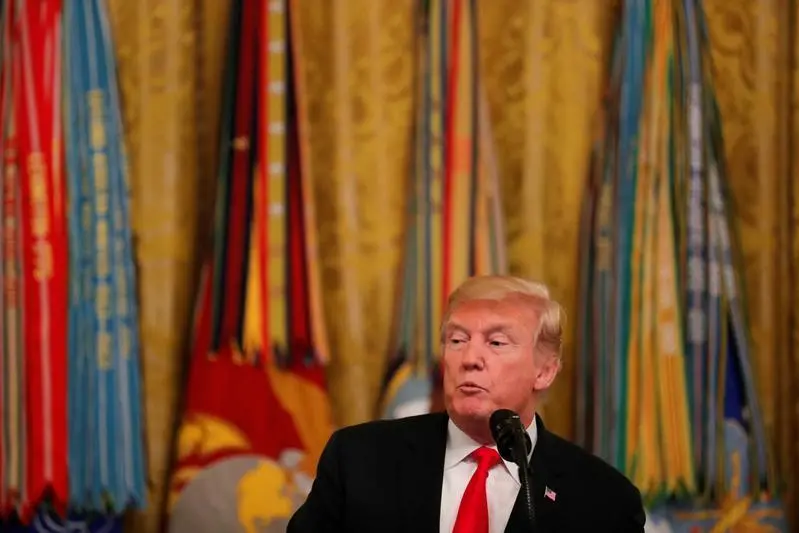PHOTO
- Asian shares retreat, tracking a drop on Wall Street
- Middle East markets drop, Saudi Arabia adds gains
- Oil prices drop on trade tensions
- The dollar adds gains, gold prices retreat
United States President Donald Trump said on Monday that he will impose 10 percent tariffs on about $200 billion worth of Chinese imports, escalating the trade war between the two biggest economies in the world.
Global markets
Asian shares fell in early trading on Tuesday, tracking a retreat on Wall Street overnight, which occurred as a reaction to the renewed trade tensions.
MSCI’s broadest index of Asia-Pacific shares outside Japan dropped 0.15 percent in early trade.
On Wall Street, all three major indices fell overnight and Nasdaq posted its biggest percentage loss since late July.
“Considering his latest comments, as well as recent falls in his support, it is hard to expect Trump to soften his stance on trade in the near future,” Norihiro Fujito, chief investment strategist at Mitsubishi UFJ Morgan Stanley Securities, told Reuters.
“Tariffs on another $200 billion will mean about 12 percent of US imports have seen a tariff hike. That means an average tariff increase of 1.6 percent across all imports, so tiny compared to the 1930s, when they were 20 percent,” Shane Oliver, chief economist at AMP Capital Investors in Sydney, told Reuters.
“I still don’t see a resolution between China and the U.S. until after U.S. mid-terms elections in November to early 2019.”
Middle East markets
Most markets in the Middle East dropped on Monday on trade tensions between the U.S. and China. The Saudi index was the exception and the top performer among its peers.
Saudi Arabia’s index gained 1.9 percent, rebounding from a six-month low on Sunday.
Saudi Kayan Petrochemical was the best performer, soaring 8.1 percent in heavy trading, while National Commercial Bank jumped 7.2 percent and Samba Financial Group added 5.8 percent.
Abu Dhabi’s index retreated 1.7 percent, as top real estate firm Aldar Properties dropped 2.7 percent. The biggest bank, First Abu Dhabi, lost 2.6 percent.
Dubai’s index fell by 0.8 percent to a 32-month low. Blue chip Emaar Properties shed 1.7 percent and Damac Properties sank 2.9 percent.
Egypt’s index dropped 0.7 percent, Qatar’s index lost 1.1 percent, Kuwait’s index edged down 0.03 percent while Oman’s index lost 1 percent and Bahrain’s index edged 0.2 percent lower.
Oil prices
Oil prices retreated on Tuesday due to trade tensions between the U.S. and China, but concerns of tightening global supply limited losses.
Brent crude futures declined by 27 cents, or 0.35 percent, to $77.78 per barrel by 0054 GMT. U.S. West Texas Intermediate (WTI) crude fell 32 cents, or 0.46 percent, to $68.59 per barrel.
“The growing trade dispute has hurt trading sentiment. The impact on economic growth is slowly dripping in, which again hurts oil prices,” Wang Xiao, head of crude research at Guotai Junan Futures, told Reuters.
Currencies
The dollar edged up in early trading on Tuesday.
The dollar index against a basket of six major currencies was up 0.09 percent at 94.585. The greenback in recent months has benefited from the trade war between the U.S. and China.
The dollar was also 0.1 percent higher at 111.94 yen.
Precious metals
Gold prices retreated as a result of the stronger dollar.
Spot gold fell 0.2 percent at $1,198 an ounce at 0309 GMT, after rising 0.6 percent in the previous session.
U.S. gold futures were down 0.2 percent at $1,203.90 an ounce.
(Writing by Gerard Aoun; Editing by Michael Fahy)
(gerard.aoun@thomsonreuters.com)
Gain a deeper understanding of financial markets through Thomson Reuters Eikon.
Our Standards: The Thomson Reuters Trust Principles
Disclaimer: This article is provided for informational purposes only. The content does not provide tax, legal or investment advice or opinion regarding the suitability, value or profitability of any particular security, portfolio or investment strategy. Read our full disclaimer policy here.
© ZAWYA 2018





















